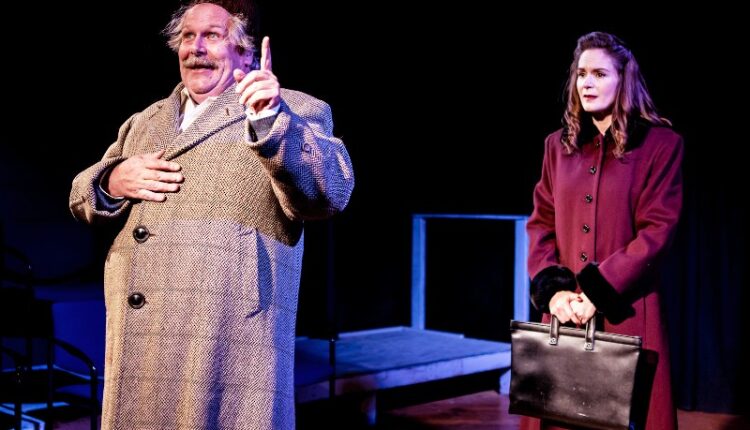by Hugh Gallagher, Pulp
Can a great man also be a good man? What do the words great and good mean?
This is the theme of Mark St. Germain’s play Relativity, which explores the character of physicist Albert Einstein, who has become the very definition of genius.
Germain takes a troubling decision by Einstein and its impact on his professional and personal life to explore the complex balances and compromises that people make to follow their passions, in Einstein’s case a passion that would change forever the way we look at the universe.
Carla Milarch directs the Theatre Nova production of Relativity, which strikes a complex balance of its own, weighing gentle comedy against serious inquiry into the compromises Einstein made to follow his genius.
As the play opens we are introduced to the sly, humorous, flirtatious Albert Einstein talking to a woman claiming to be a reporter for a Jewish newspaper who’s begging him for an interview. He is beguiled by her, as he often was by women, and asks her to come to his home office. At the time, Einstein was a professor at Princeton University.
The woman comes prepared with background information on Einstein’s life, his great theories, his humanitarian efforts, and his genial disposition. She also comes to challenge Einstein’s life and a serious choice he made.
In 1902 Einstein’s future first wife Mileva Maric gave birth to a daughter who developed a serious case of scarlet fever. The fate of that child has remained a mystery. Did the girl called Lieserl die? Or was she put up for adoption? Letters from Einstein suggest the latter. St. Germain chooses to build his play on the idea that she grew up and had issues with her very famous father.
Milarch and her talented three-person cast present a production that builds on the basic idea that there are no easy answers to life’s questions. Those with special genius, unique talents, and world-shattering ideas often neglect the more immediate demands of relationships and families.
Phil Powers begins his performance with all the trademark Einstein character we have come to admire, as much for his lovable presence as his genius. He has that wild, white mop of hair; that puckish grin and twinkling eyes; that jolly German accent. The set has a violin in the corner of the office and scattered papers on several shelves, evoking the epitome of the world’s most famous absent-minded professor.
But as the “reporter” begins to challenge him and push him to defend himself, Powers becomes a trapped tiger. He tries charm and when it doesn’t work, his eyes grow beady and then haunted. But he gives as good as he gets. Powers presents Einstein as the fighter, the survivor that he was. But he also shows behind Einstein’s rationalist arguments, there is a pained look of doubt.
St. Germain’s play has the reporter decry Einstein’s plea of exceptionalism and offers up Charles Dickens, Henry Ford, and others as “great” men who weren’t especially “good” men. Dickens was a great writer who abandoned his wife and children to run off with an actress. Ford used the assembly line to build an industry that put the world on wheels and was a famous anti-Semite.
The conversation takes a darker tone when the issue of Einstein’s daughter is raised.
Anne Damman plays the “reporter” Margaret as a woman who understands that Einstein enjoys flirting with younger women, who loves to charm them with his humor and his intellect. Damman begins a charm campaign of her own and then begins to challenge and probe into the mystery of the daughter. Margaret has her reasons, which again confront Einstein with the distracting weight of family relations.
Ellen Finch rounds out the cast as Miss Dukas, Einstein’s long-time aide, housekeeper, and lover. Finch plays her as a fierce firewall for the genius who cannot be bothered by the trivialities of the world. Dukas finds the subtle humor in her conspiracy-minded character and offers a defense of the genius and his right to claim exceptional privilege.
I won’t reveal the spoilers here, but you probably see where this is going. There is a point where Einstein struggles not only with his, to some, troubling decisions but also with his legacy.
The play runs about 90 minutes and is both humorous and serious. It raises some issues that parents with “gifted children” must confront. What does being exceptional mean and how does that conflict with living what some consider a “normal life.” St. Germain makes his point: it’s complicated.
Forrest Hejkal’s set design is evocatively furnished and makes excellent use of Theatre Nova’s limited space.
Theatre Nova’s production of Mark St. Germain’s “Relativity” continues at 8 pm on Thursdays-Saturdays, and 2 pm on Sundays through June 19 at 410 W. Huron, Ann Arbor. For tickets visit TheatreNOVA.org or call 734-635-8450.


Comments are closed, but trackbacks and pingbacks are open.